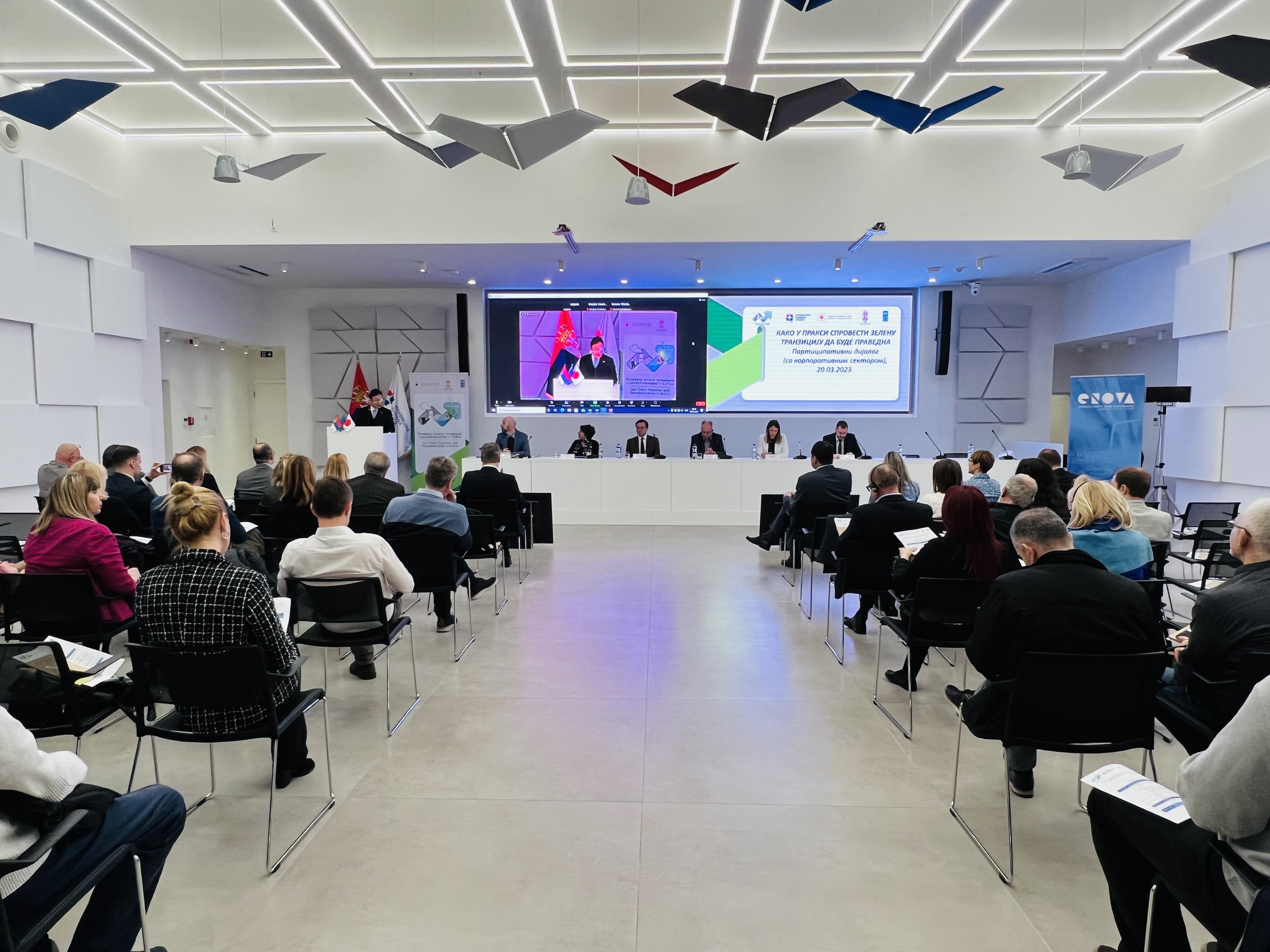Dialogue on the role of economy in a Just Green Transition
March 20, 2023

Belgrade, 20 March 2023 - With the support of the Government of Japan, the United Nations Development Programme (UNDP) has organised a dialogue with representatives of the business sector in Serbia, about implementing the green transition of Serbian economy in a just manner, taking into account the specific characteristics of the sector and the region which extensively relies on the consumption of fossil fuels. The dialogue was organised in partnership with the Ministry of Environmental Protection and the Ministry of Mining and Energy, and in cooperation with the Chamber of Commerce of Serbia.
“In today’s world, many countries try to accelerate their green transition so as to secure their supply of clean and stable energy sources. It is essential, together with stimulating green transition, to secure unobstructed flow of workforce and build a society that would leave no one behind,” said His Excellency Takahiko Katsumata, Japanese Ambassador to the Republic of Serbia, and added that Japan would continue to cooperate with Serbia, a Japan’s friend for 140 years now, as well as with international organisations, in building a sustainable smart society with a healthy environment.
“The green transition will improve quality of the environment and better health for the people, yet it requires changes in economy, industry, energy and transport. Decreasing the emission of greenhouse gases in these sectors could significantly contribute to realisation of the Serbian ambition to cut this emission by 33.3% compared to 1990. It is therefore important that we enable as many investments as we can and facilitate economic growth based on green technologies, simultaneously paying attention to the challenges such as closing of the existing and opening of new jobs, as well as workforce retraining,” said Sandra Dokić, State Secretary of the Ministry of Environmental Protection.
Jovana Joksimović, Acting Assistant to the Minister of International Cooperation and European Integrations in the Ministry of Mining and Energy said that the green energy transition is the question of attitude towards our future and whether we wish to have enough energy and a healthier environment.
“The Republic of Serbia has initiated the process of energy transition with the aim of decreasing the energy sector’s dependence on fossil fuels. We work on preparation of the strategic documents which would define our long term goals in the field of renewable energy resources. Decarbonisation plan needs to be realistic and sustainable, to provide for our energy stability at all times,” clarified Joksimović.
Deputy Resident Representative of UNDP in Serbia, Anas Qarman, highlighted that the principle of fairness should be a constituent part of the process of leaving fossil fuels:
“With the support of the Government of Japan and in partnership with the Government of Serbia, UNDP wants to find a way of securing adequate support for the workers, as well as the sectors and local communities in Serbia that currently depend on extensive use of coal, so that everyone would have equal benefits of the green transition,“ said Qarman.
Director of the Sector for Strategic Analyses, Services and Internationalisation of the Chamber of Commerce of Serbia, Mihailo Vesović, said that green transition is our new reality, and that this is the first transition which does not aim to make life more profitable and faster, but has a universal goal – to avoid the crisis caused by the greenhouse effect.
“In order for this process to be successful and without negative circumstances on individual branches of industry, it needs to be gradual. It is necessary to have a coordinated approach of all state authorities and participants in the process and it is important that we have support by a country such as Japan, which can share its experiences in the field,” said Vesović.
More than 100 representatives from different sectors of the economy, with the crucial role in the green transition, participated in the dialogues: from the large manufacturers, big consumers of electrical energy, and industrial plants, to small and medium size enterprises, as well as representatives of unions, academic community and civil society.
In the panel discussions, they considered the ways for business entities to timely adjust all of the phases of their operation to the process of green transition, in order to decrease the risk of losing jobs, implement workers’ retraining and improve the capacities of the companies for research and innovation. Additionally, the discussions addressed available resources and potential models of funding for such green transition.
This event represented the conclusion of the series of dialogues that started in October 2022, with the participation of representatives of the competent ministries, employers, unions, civil society, international organisations, as well as two local communities from the region whos economy relies on coal production.
The aim of these dialogues was to identify a common response by the entire society to the question of how the green transition could be implemented to respect the interests of all citizens, and avoid deepening the social inequalities. Based on the conclusions of this wide consultation process, the Government of Serbia would develop the Plan of a Just Transition towards the Low Carbon Economy of Serbia.
The dialogue with economic actors concerning the transition of the economy was organised as a part of the project titled “Just Green Transition and Decarbonisation in Serbia”, implemented by UNDP in partnership with the Ministry of Mining and Energy, and financially supported by the Government of Japan.
Within this initiative, 8 companies were selected through a public tender, and received co-financing amounting to 600,000 USD in total, to implement innovative solutions that contribute to the use of renewable energy resources and opening of new, green jobs, as well as to the decrease in the emission of the greenhouse gases equivalent to 240,000 tons of carbon dioxide in the next 20 years.

 Locations
Locations